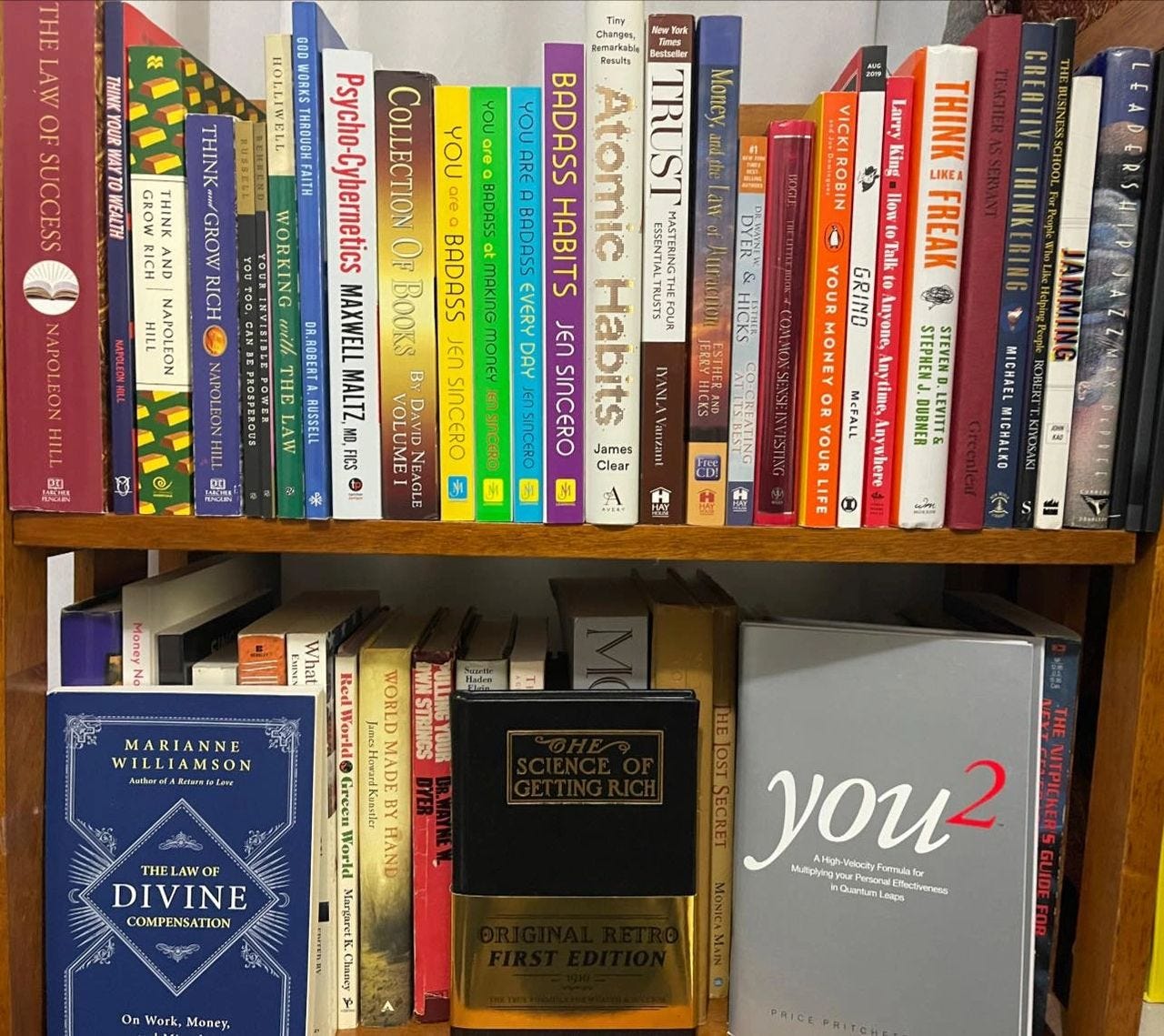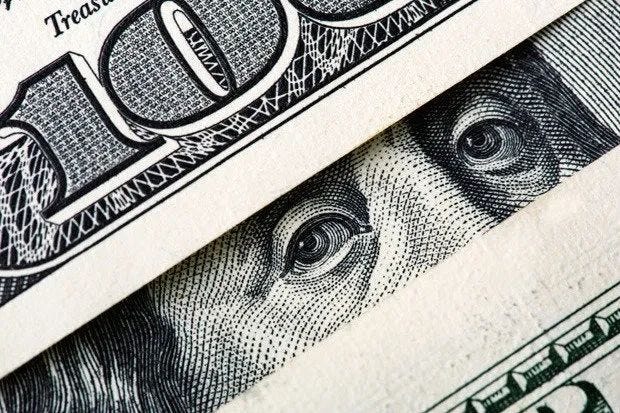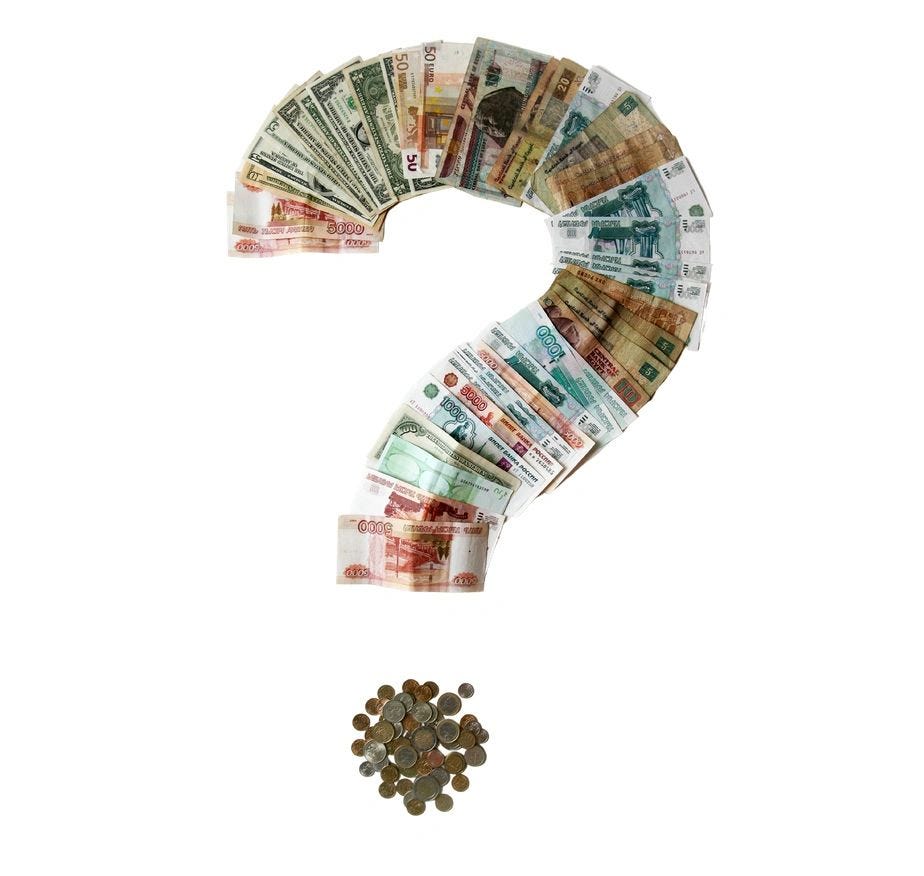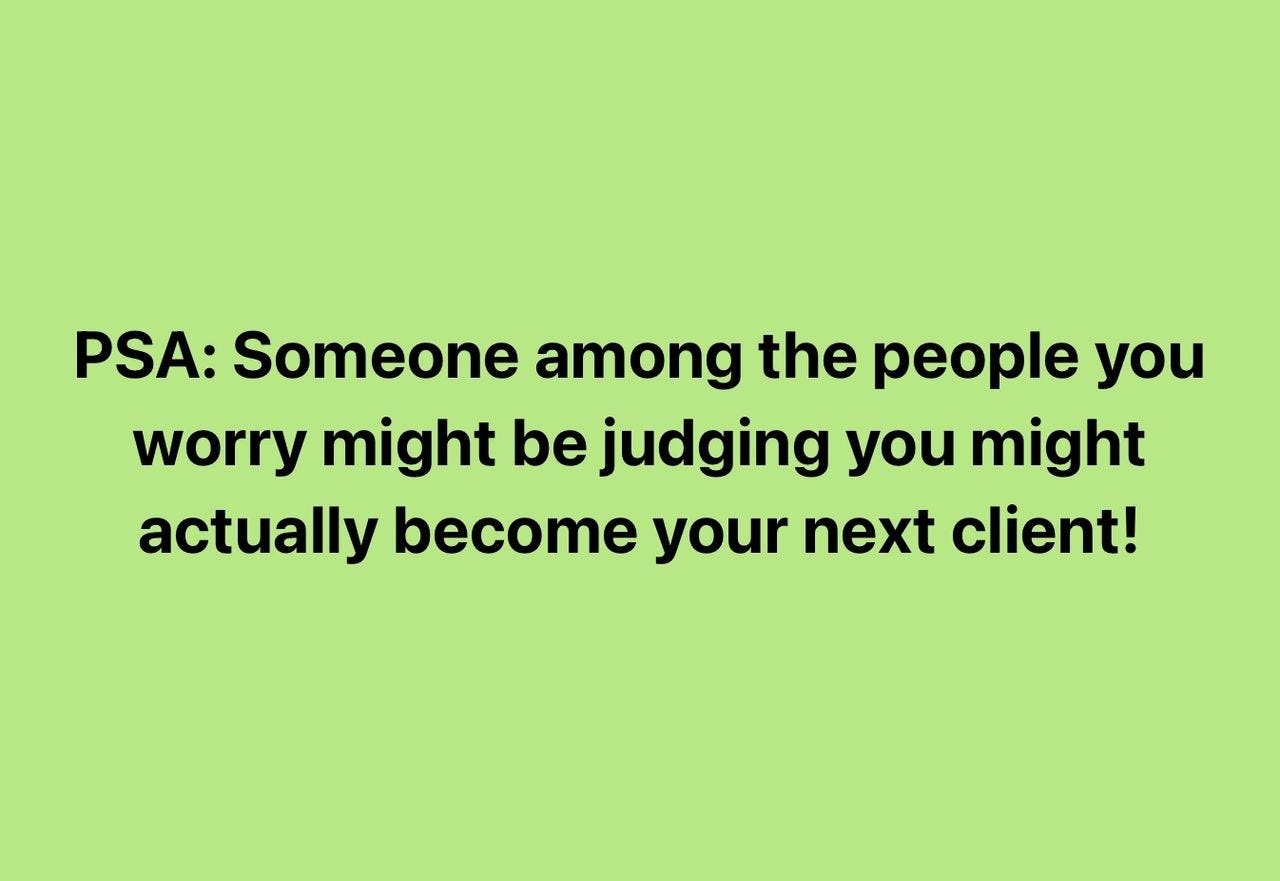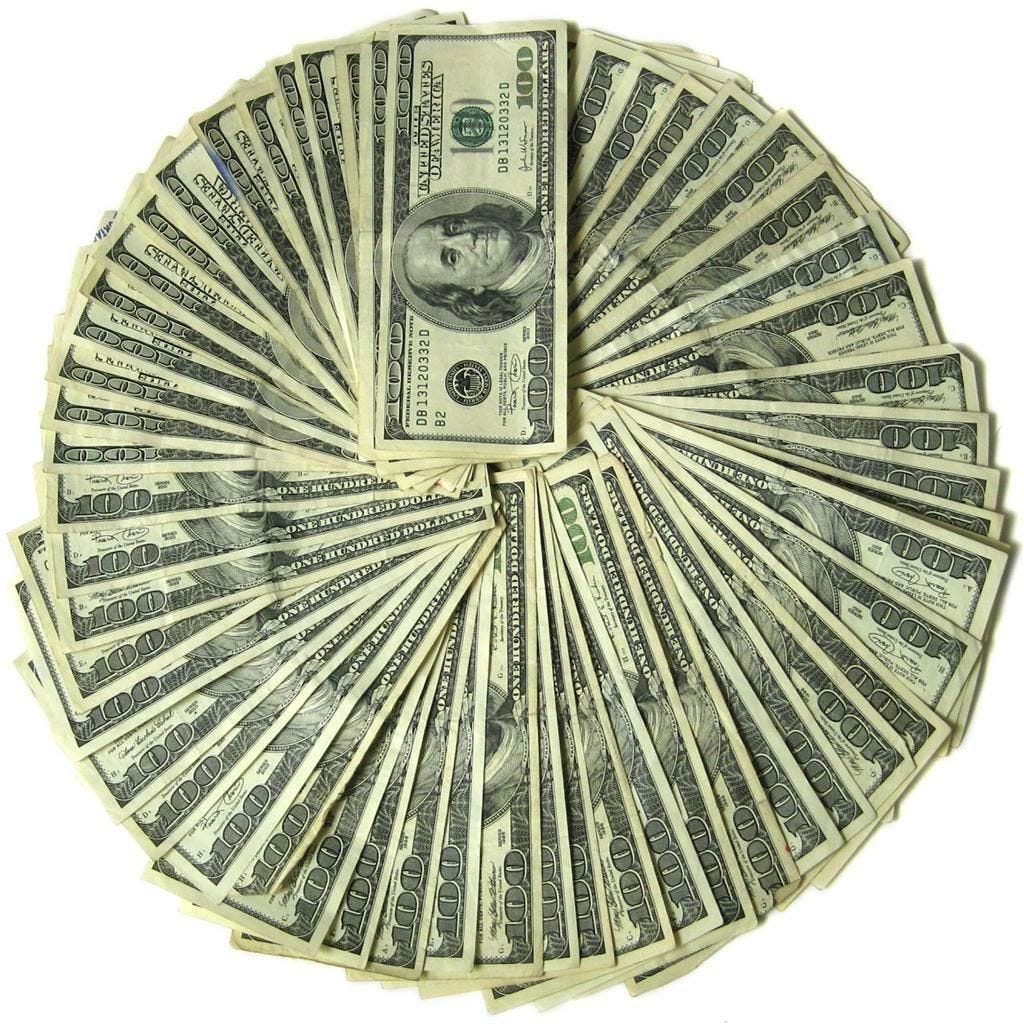How to Charge Whatever You Want
Could the sky really be the limit for how much you earn? What if it just came down to a couple of questions?
Could the sky really be the limit for how much you earn?
What if it just came down to a couple of questions?
I started reading a lot of self-help books when I was deciding to invest in myself and finally try private coaching to get unstuck from my mid-life crisis of not having any of the "safe" academic jobs nor business success I was supposed to have by the age of 35, among other life challenges.
Jen Sincero's books You Are a Badass and You Are A Badass At Making Money were among the first of now many self-help books sitting on my physical shelf. As I was struggling while living on the west side of Los Angeles at the time, her story of wishing she could afford to live near Venice Beach was quite relatable.
After finishing her second book on making money, one thing I remembered most was how the author said she paid $85,000 for coaching with a prominent figure in the coaching industry—in 2009 during the Great Recession no less. My first coach happened to ask me in our first session if I thought $100,000 was a lot of money. My quasi-sarcastic response was something along the lines of "Must not be since people pay almost that much for coaching!"
Two years later, I figured out who the coach was, and so I studied more of their teachings and attended a few seminars; my mindset was more than ready to agree any amount would indeed be worth it if the opportunity presented itself.
So how do you likewise charge premium fees?
According to the Law of Compensation, you are paid in direct ratio of these three things:
The need for what you do.
Your ability to do it.
The difficulty in replacing you.
So if we're not in a competitive commodity type of business and we're offering something for which our uniqueness makes us irreplaceable, creating an experience worthy of charging however much we want for what we uniquely have to offer comes down to two questions:
1. Is the value of your offer greater than the value of what you're receiving?
AND
2. Can you let go of the judgment of others?
QUESTION #1:
Is the value of your offer greater than the value of what you're receiving?
One of the most liberating takeaways when I first read The Science of Getting Rich, published over a century ago by Wallace D. Wattles, was reading that as long as the "use value" of your product or service in the life of the buyer is greater than the "cash value" of what you're receiving, you can practically charge any amount you want to charge. Explaining this further in Chapter 6 entitled How Riches Come To You, Wattles wrote:
"The paper, ink, and other material in this book may not be worth the money you paid for it; but if the ideas suggested by it bring you thousands of dollars, you have not been wronged by those who sold it to you; they have given you a great use value for a small cash value."
So if a specific course of study or sequence of teaching, coaching or other mentorship could help someone double, triple, or even 10X their income, whether it's by getting a job promotion or successfully launching a business venture, would it be appropriate to pay maybe thousands or even tens of thousands or more? Jen Sincero went from barely scraping by to creating a seven-figure net worth in just a few years.
What kind of return on investment (ROI) can you deliver? Is your offer something that could lead to earning or saving more money, either directly or indirectly? Or if you're doing something where the ROI is not easily or directly measurable with money, what might be some examples of non-monetary outcomes people would nonetheless pay a lot for? Are there any other ways you may be giving more in use value than you're taking in cash value?
(Also, check out this previous post for what to include in the experience!)

8 Billion and Counting...
So long as it's an actual viable product or service where the above value proposition fits, there can be a buyer somewhere in the world for nearly any price point if the transformation is worth it. And in this internet age, the world is literally at our fingertips.
On November 15, 2022, the world population officially exceeded eight billion. So while it may be easy to dwell on the correlating increase in global poverty and assume most people won't be able to afford what we're offering if we charge too much more, what if we reframed how we look at the numbers?
If even just 0.01% of the global population made up our target market, that would mean there would still be 800,000 people in the world we could potentially serve. If even only one percent of those people could afford to pay for an expensive or "high-ticket" offering, that would mean there would still be a pool of 8,000 prospects.
We may not even need a quarter of one percent of that group per year to create a very lucrative business with a “high-ticket” offer. Just a handful of clients at a time could get you up into the six-figure earnings stratosphere. And then if you stack the high-ticket offer with mid-tier and lower-cost offers for a wider variety of clients with different budgets, it’s not impossible to eventually create a multi-six- and ultimately seven- or eight-figure venture too!
QUESTION #2:
Will You Let Go of the Judgment of Others?
After you determine you have a product or service that is viable and fits the equation where the use value given is greater than the cash value received, the other question to sincerely ask is how much are you willing to let go of the judgement of others and any correlating fears of rejection on the way to finding who among the 8 billion you're most meant to serve.
One of the hardest things about entrepreneurial growth is learning how certain people close to us may not support our journeys or only up to a certain point. Are you willing to let them and their beliefs go or at least have firm boundaries in place so they can't hold you back? Are you willing to create boundaries to protect yourself from the internet trolls and others who might accuse you of being "just for the rich" or of causing global income inequality?—I’ve actually been accused of that before!
Effective marketing and messaging not only attracts the people we're meant to serve, it also repels the people we're not meant to serve—including the trolls!
If you do worry about judgment of others, what if you could reframe that worry into a more empowering possibility? What if your next client could be among the people you fear the judgement of? It happened to me before. So we have to condition ourselves to treat the sales and marketing process like an unbiased numbers game, and one of the hardest things to do can be as simple as not taking the rejections and judgements personally.
I once heard a coach say that if you're converting more than 30% of your qualified prospects, you likely can and should charge more. But in addition to the fear of charging too high of a price, we also have to deal with the thought of 70% or more of our prospects actually saying "No" and passing even more judgement on us in the process. But when we improve our processes for qualifying leads, the number who would actually make it far enough into the process to actually say “No” won't necessarily be as high. But until then, what if you reframed how you looked at such stats? What if you focused on the fact that for every seven or so people saying “No,” you could be getting up to three people saying “Yes”?
So Am I Just for the "Rich"?
Some may judge this post and accuse me of only promoting services by and for "the rich" or that I'm perpetuating the evils of capitalism. It comes with the territory of being for entrepreneurs, even heart-centered, artistic ones. Some clients may happen to be rich, at least in comparison to most others, or they’re not anywhere near “rich” yet, but rightfully desire to grow their wealth.
Like many “Main Street” boutique business owners, my clients likewise can get such accusations, so I often remind them of their value and help them strike a balance so they're not letting their charitable ideals hinder their business. No matter my client's income level, my job is to help them rewrite any negative money stories and change any limiting beliefs about wealth and success keeping them from their next level of abundance so they can do even more good in the world.
Just as there can be someone for any price somewhere among in the world's 8 billion, any price for anything could also be too much—or too little!—for someone somewhere. You could even offer to pay people to use your product or service, and there would still be someone for whom no amount you pay them could be enough. We can't be all things to all people, but even our "broke" clients will attempt to find ways to be resourceful and pay if we're offering the transformation they most want.
In order to come up with the $85,000 to pay for the coach when she had nearly nothing in the bank, Jen Sincero said she was able to borrow at least the down payment from a close friend who, as she wrote, "Believed in me." She then proceeded to fearlessly promote and sell her life coaching and book-writing courses, and she earned it all back and then some on the way to becoming a multi-millionaire. Would you like to do so? What if it’s more possible than most belief systems would have us believe?
Ready to believe in yourself?
Thanks for reading!
Ready to charge whatever you want? Send me a message and let’s talk. Otherwise, keep reading the other articles here.





